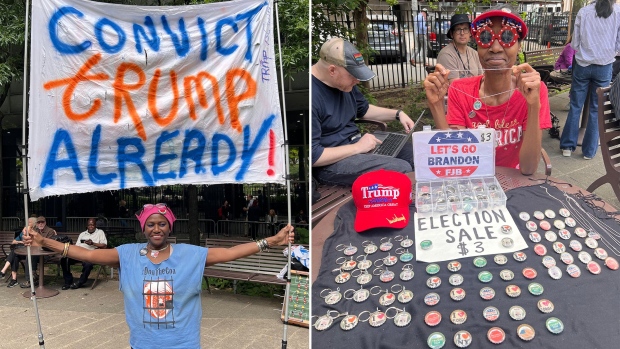May 30, 2024
Trump Jury Rehears Account of How Tabloid Buried Model’s Story
, Bloomberg News

(Bloomberg) -- The New York jury that will decide Donald Trump’s fate began its second day of deliberations Thursday by listening again to testimony about how the National Enquirer publisher took a negative story about Trump “off the market.”
The Manhattan jury was read earlier testimony by David Pecker, the chief executive officer of American Media Inc., discussing how he bought and buried a story in 2016 about a former Playboy model who said she had an affair with Trump. Pecker testified in April that he told Trump on a phone call that he would not publish the story about Karen McDougal.
Pecker said that Trump called McDougal a “nice girl,” leading him to believe the story was true and “it would have been very embarrassing to himself, and also to his campaign.”
The testimony, read back by two court reporters, was one of several items requested by jurors weighing whether the former president falsified business records to hide hush money payments before the 2016 election. Jurors must decide whether Trump had an intent to fake the records even as he planned to commit other election law or tax violations.
Jurors resumed deliberations at 11:15 a.m. after hearing the testimony. They continued into the afternoon without sending any additional notes to the judge.
Merchan has told them that they are scheduled to finish for the day at 4:30 p.m., but can ask to stay as late as 6 p.m. if they feel they are making progress.
Read More: Meet the Manhattan Jury That Will Decide Donald Trump’s Fate
In addition, the jurors had asked to hear testimony about a key 2015 meeting at Trump Tower attended by Pecker and Michael Cohen, Trump’s former lawyer, where they allegedly hatched a scheme to boost the billionaire real estate developer’s campaign. Pecker testified that he agreed to alert Cohen to damaging stories about Trump and women.
Before the jurors heard the witness accounts, Justice Juan Merchan read them about half of legal instructions he gave them Wednesday. Just hours after hearing them the first time, the jurors asked to hear them again.
Merchan defined intent as a “conscious objective or purpose” to break the law, as opposed to motive, which is why someone broke the law. Intent is always the heart of any white-collar case.
Jurors must also agree unanimously that Trump intended to promote his election in 2016 by any one of three “unlawful means.”
One method was a violation of the Federal Election Campaign Act, which set a limit on contributions to candidates at $2,700 a year. The second method was falsifying other business records, including the actions by Cohen in setting up shell companies to pay $130,000 to Stormy Daniels, an adult-film star. The third was violating New York City or state tax law by submitting fraudulent information related to any return.
The requests may suggest jurors are working through the chronology laid out by prosecutors. Trump is accused of 34 counts of falsifying business records to conceal the $130,000 payment to Daniels just weeks before the 2016 election.
Pecker was the government’s first witness and jurors may want to refresh their memory about the meeting.
Meanwhile, the crowd outside the courthouse in lower Manhattan has grown in recent days, with a sea of television crews from around the world lining the sidewalk across the street. The park behind them is home to a boisterous group of Trump supporters, some of them blowing horns, waving flags and hoisting signs claiming the trial was unfair. A maze of police barricades separates them from a much smaller group of anti-Trump protesters, one of whom holds a banner saying, “Convict Trump already.” Tourists, office workers and other curious pedestrians filter through the park to observe the scene.
--With assistance from Hadriana Lowenkron.
(Updates with schedule in sixth paragraph.)
©2024 Bloomberg L.P.







